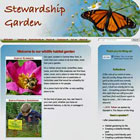| Edible Gardening CNY |  | |
Sun., Apr. 14, 2:00 pm in the SARGENT ROOM at Liverpool Library.
Topic: Crop rotation and succession planting by Cornell Cooperative Extension Master Gardeners
|
Eat Your Enemy
Earth Day Event
|
 | | Garlic mustard |
| |
April 20, 10 am - 1 pm
Once again, Baltimore Woods needs you to be part of our special task force against the highly invasive garlic mustard.
This edible plant was brought to America as part of pioneer gardens; however, it is invasive and now endangers native woodland wildflowers.
Whether you volunteer pulling garlic mustard or sprucing up the trails, grounds or gardens, you will be treated to a unique and delicious lunch featuring garlic mustard as the main ingredient.
Bring your friends and eat your enemy!
Please register by calling The Woods at 673-1350.
|
Weekend Wildflower Walks at the Woods
April 20, 21, 27, 28
2-3pm |
 | | Trilliums |
| |
The premiere woodland wildflower garden at Baltimore Woods is a local treasure.
Join caretaker Audrey Loewer for a pleasant walk through one of the wonders of spring. Each week new species will bloom, and Audrey will reveal their past and present medicinal and culinary uses.
The garden is handicap accessible.
Meet at the Pavilion.
Donations appreciated.
|
Tour of the Geddes Brook Wetlands/ Nine Mile Creek Areas
|  | |
Sat., April 20, 10 - noon, sponsored by the Sierra Club Outdoor Program.
Honeywell's Joe McMullen will be our tour leader. Meet at the Onondaga Lake Visitors' Center off of 690 exit 7. Start with a briefing of the lake cleanup, then carpool to Geddes Brook to start a walking tour.
Free and open to the public.
For information, call 492-4745
|
Chasing Ice
"One of the most beautiful films of the year"
Mon., April 22 at 7:00 pm at The Palace Theater
|  |
This film has won 23 awards at film festivals around the world. Following the film, a Climate Impacts and Actions in CNY panel presentation will explore the documentary's environmental implications from a local perspective. The panel will consist of Dave Eichorn, syracuse.com meteorologist; Chris Carrick, Energy Program Manager for the Central New York Regional Planning and Development Board; and Yvonne Rothenberg, Founder of the CNY chapter of the Citizens Climate Lobby. Moderating the panel will be Chris Bolt, WAER news and public affairs director. Suggested donations: At the door: $10 Seniors/students: $5 Children 12 and under: Free For advance sale tickets, go to Greening USA. Free parking in rear of Palace Theater. |
Plantasia at Baltimore Woods
Sat., May 18,
8 am - 2 pm
(Members only - Fri., May 17, 4 pm - 7 pm)
|
 | | Goldenrod |
|
Available at the member's only event on Friday are free chestnut tree seeds ready for planting. Native plants, food, regional vendors and more! For more information, call 673-1350 or visit the website for more details.
|
| Our Habitat Garden |  |
Visit Our Habitat Garden website for information on providing habitat, earth-friendly gardening practices, plants, and various creatures here in Central New York.
|
HGCNY Officers
| |
| President:
Janet Allen
Vice-President:
Carol Biesemeyer
Treasurer:
Randi Starmer
Secretary:
Soule Leiter
Membership:
Linda Rossiter
Program Chair:
Carol Biesemeyer
Newsletter Editor:
Janet Allen
Additional Planning Committee Members:
Beth Mitchell
Dave Mitchell
John Allen
Peter Huntington
|
| HGCNY on Facebook |
As as more of us participate on our Facebook page, this will become a useful resource for asking (and answering!) local HGCNYers' questions about habitat gardening. |
|
Join HGCNY!
|  |
Becoming an official member of HGCNY is easy: just join Wild Ones! Basic household membership is $37/year, but there are other options, too. (See membership application or website.)
Wild Ones
P.O. Box 1274
Appleton, Wisconsin 54912-1274
Make checks payable to Wild Ones.
Or telephone toll-free 877-394-9453.
|
|
Our Edible Garden
|  | Visit OurEdibleGarden.org to see an example of a Central New York edible garden, the perfect companion to your habitat garden.
|
| Interested in Edible Gardening? | 
|
If you'd like to get information on Edible Gardening CNY, just email John to find out about edible gardening tours and monthly programs. Free and open to the public! |
|
Greetings!
 | Oblong-winged katydid
(Amblycorypha oblongifolia) |
Jim D'Angelo, Director of Sterling Nature Center, returns for our final regular program this year. In the past, he has presented programs on butterflies, bats, vernal ponds, dragonflies, and more. What this year? He'll talk about an especially important group of creatures: Insects: the good, the bad, the interesting and the unseen.
The program will start with the basics of insect identification and classification, and then we'll take a closer look at a few insects. We'll discuss a few of the "bad" insects, like the Emerald Ash Borer, that threaten our ecosystems. And then some of the many "good" insects that play vital roles in our environment, like the native pollinators, that need a bit of our attention. Lastly there are those insects we tend not to notice that have interesting roles in our ecosystems.
When: Sun., April 28 at 2:00 pm
Where: Liverpool Library ( Directions)
Free and open to the publicMonarch programs
I'll be giving presentations about Creating a Monarch Waystation and a Butterfly-friendly yard at the following times and locations: Tues. April 23 at 6:30 pm Fulton Public Library Sat. May 4 at 10 am at Baltimore Woods Nature Center Sat. May 4 at 3 pm at Beaver Lake Nature Center Wed. May 8 at 6:30 pm Liverpool Public Library Thurs. June 13 at 7:00 pm Dewitt Community Library
Other programs
I'll also be presenting a program on Habitat Gardening for Life.
Wed. May 22 at 6:30 at Northern Onondaga Public Library in Cicero.
Janet Allen President, HGCNY |
|
|
Insect hotels / Garden art
 | An insect hotel
Photo: Peter Caine (CC)
|
Here's a way not only to help insects, but also to create beautiful yard art.
For some inspiration, go to Inspiration Green to see the many beautiful ways you can provide homes for bees and other beneficial insects.
(Note: These photos were taken all over Europe where such insect hotels are very popular, so plants mentioned are native to Europe.)
The many beautiful structures are made of recycled materials and are all uniquely different and beautiful. Some are as simple as piling materials on wooden pallets; others are more elaborate. You'll be inspired to make one yourself!
|
|
The buzz on bees this year
 | | Honeybee on swamp milkweed |
Honeybees
Since 2005, the mysterious Colony Collapse Disorder has affected honey bees. (Note: Honey bees are not native to North America.)
How did the honey bees fare this winter? Not so well. As a New York Times article said, "A mysterious malady that has been killing honeybees en masse for several years appears to have expanded drastically in the last year, commercial beekeepers say, wiping out 40 percent or even 50 percent of the hives needed to pollinate many of the nation's fruits and vegetables." The article notes that the almond crop is a bellwether. Eighty percent of the almonds grow in California, and the cost of renting hives to pollinate the crop is $200 a hive, 20% above normal, due to the scarcity of honeybees. There is growing consensus that neonicotinoids, a class of pesticides, as well as herbicides and fungicides are factors in the decline. According to a BBC report, research suggests these chemicals interfere with bees' ability to learn and remember. Metals and bumblebeesIn a Science Daily report, Univ. of Pittsburgh research has found that "bumblebees are at risk of ingesting toxic amounts of metals like aluminum and nickel found in flowers growing in soil that has been contaminated by exhaust from vehicles, industrial machinery, and farming equipment." If this is indeed a problem, a related problem is that a so far environmentally-friendly technique for decontaminating soils, called phytoremediation, may need to be used with greater caution. Buzz KillDan Rather has a sobering report on bees called Buzz Kill, which can be viewed on YouTube (the first 35 min of the hour-long program).
IMPORTANT TAKE-HOME MESSAGE
In addition to advocacy, we can do our part to help preserve the future of food by
* planting native plants for native bees,
* providing places for ground-nesting and wood-nesting bees, and
* avoiding pesticides and other chemicals.
|
|
Other insects in the news
 | | Dragonfly |
Dragonflies
You can see some amazing mini-videos of dragonflies' abilities (as well as a frog that failed to catch a dragonfly) in this New York Times article "Nature's Drone, Pretty and Deadly." Although dragonflies are on most people's short list of insects they like, "they are also voracious aerial predators, and new research suggests they may well be the most brutally effective hunters in the animal kingdom."
The Beauty of Pollination video Although we've noted this incredible video in the past, it's still worth another visit or a first visit for those who haven't yet seen it. Join the over 24 million people who have viewed The Beauty of Pollination on YouTube. And the TED talk by the videographer, Louie Schwartzberg, is wonderful, too.
Good news about the Asian long-horned beetle
New Jersey has declared victory in its war against the Asian long-horned beetle, which threatens many of the most-common tree species such as maples, London planes, birches and poplars.
In the process of fighting the insect, more than 20,000 trees were removed, but the pest now seems to be eradicated in the Garden State. Illinois was the first state to declare victory.
The New York Times article notes that "Massachusetts, New York and Ohio are still in the fight, with federal, state and local officials using a combination of techniques, including tree removals, insecticide injections, public education and surveillance." Let's hope we're as successful as Illinois and New Jersey!
Mosquito management and wetlands
The Xerces Society has issued a report that states:
"Insecticides are the default mosquito management tool in most areas, and each year tens of millions of acres of wetlands are treated with pesticides... Their use is often reactive, ineffective, and harmful to water quality and wildlife."
The report recommends effective practices such as public education, conserving natural enemies
and using state-of-the-art GIS surveillance.
|
|
Adirondacks and monarchs
 | | Monarch |
AdkAction.org has asked that anyone with a connection with the Adirondacks (or even if you don't) to send a letter to the editor to the Adirondack Daily Enterprise about the importance to monarchs of roadside management and other issues. (Go to the Opinions section to find the link for submitting a letter.) Here's information from AdkAction about monarchs. |
|
|
|
|